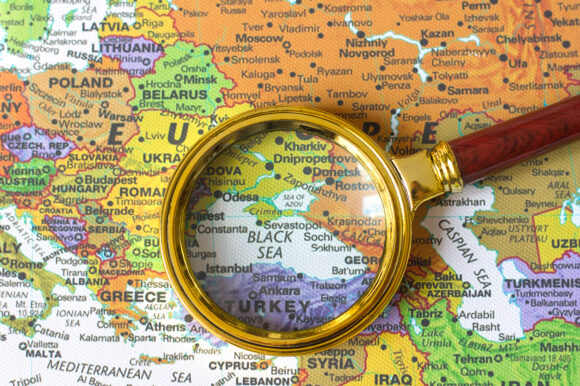Ukraine announced a “humanitarian corridor” in the Black Sea on Thursday to release cargo ships trapped in its ports since the outbreak of war, a new test of Russia’s de facto blockade since Moscow abandoned a deal last month to let Kyiv export grain.
At least initially, the corridor would apply to vessels such as container ships that have been stuck in Ukrainian ports since the February 2022 invasion and were not covered by the deal that opened the ports for grain shipments last year.
But it could be a major test of Ukraine’s ability to reopen sea lanes at a time when Russia is trying to reimpose its de-facto blockade, having abandoned the grain deal last month. Shipping and insurance sources expressed concerns about safety.
Russia Issues Warning to Any Ships Traveling to Ukraine’s Black Sea Ports
In a statement, the Ukrainian navy said the routes had already been proposed by Ukraine directly to the International Maritime Organization (IMO).
The routes would “primarily be used for civilian ships which have been in the Ukrainian ports of Chornomorsk, Odesa, and Pivdenny since the beginning of the full-scale invasion by Russia on February 24, 2022.”
“Vessels whose owners/captains officially confirm that they are ready to sail in the current conditions will be allowed to pass through the routes,” the statement said, adding that risks remained from mines and the military threat from Russia.
Oleh Chalyk, a spokesperson for Ukraine’s navy, told Reuters: “The corridor will be very transparent, we will put cameras on the ships and there will be a broadcast to show that this is purely a humanitarian mission and has no military purpose.”
There was no immediate response to requests for comment from Moscow.
Deputy U.N. spokesperson Farhan Haq said: “Safe navigation for merchant shipping was one of the benefits of the Black Sea Initiative, which we hope can resume.”
“The obligations of International Humanitarian Law on land and sea must be upheld.”
Shipping and insurance sources familiar with Ukraine said they were not informed about the new corridor and there were questions over its viability. It was unlikely most ships would agree to sail at the moment, they said.
“Insurers and their backing banks will have to agree and they may say we do not like the risks,” one insurance source said.
“The possibility of multiple seafarer deaths (in the event of a ship being hit) has not been addressed, so this is another major question,” a shipping industry source said.
Stuck in Ports
Around 60 commercial ships have been stuck in the Ukrainian ports since Russia’s invasion, their fates unresolved by the deal that allowed grain exports to resume in July last year.
Many of the ships’ crews have been evacuated, leaving locally hired Ukrainian staff to help look after the vessels.
Since abandoning the grain deal, Russia has said it will treat any ships approaching Ukrainian ports as potential military vessels, and their flag countries as combatants on the Ukrainian side. Kyiv has responded with a similar threat to ships approaching Russian or Russian-held Ukrainian ports.
The United Nations has said Russia’s decision to quit the deal risks worsening a global food crisis, hurting poor countries the worst, by keeping grain from one of the world’s biggest exporters off the market.
Moscow says it will return to the grain deal only if it receives better terms for its own exports of food and fertilizer. Turkish President Tayyip Erdogan, co-sponsor of the grain deal alongside the U.N., says he hopes to persuade Russian President Vladimir Putin to rejoin it at talks this month.
“I think it will not be an exaggeration to say that President Erdogan is probably the only man in the world who can convince President Putin to return to the Black Sea Grain Initiative,” Ukrainian Foreign Minister Dmitro Kuleba told Reuters in an interview on Thursday.
A German grain trader told Reuters: “People want more details about the Ukrainian temporary shipping channel announced today as it cannot work unless Russia gives a concrete commitment not to attack the ships.”
(Reporting by Olena HarmashAdditional reporting by Jonathan Saul, Michelle Nichols, Tom Balmforth and Reuters bureauxWriting by Peter Graff; editing by Alexandra Hudson)
Topics Ukraine
Was this article valuable?
Here are more articles you may enjoy.



 Inflation, Catastrophe Losses Lead P&C Underwriting Loss in 2023
Inflation, Catastrophe Losses Lead P&C Underwriting Loss in 2023  Zurich American Off the Hook on Harvard’s Legal Costs in Affirmative Action Case
Zurich American Off the Hook on Harvard’s Legal Costs in Affirmative Action Case  Kemper Exits Preferred Home and Auto Business Immediately
Kemper Exits Preferred Home and Auto Business Immediately  Kellogg’s ‘Woke’ Workplace Diversity Programs Are Illegal, Group Claims
Kellogg’s ‘Woke’ Workplace Diversity Programs Are Illegal, Group Claims 

